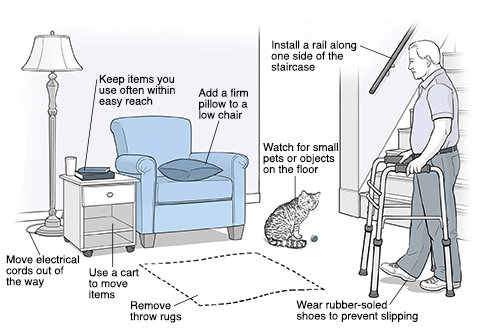Preparing Your Home After Stroke
When your loved one returns home to recover after stroke, you’ll both need time to adjust. You and your loved one will have to transfer the skills learned in rehab to a new location. Be patient with your loved one and with yourself. Planning ahead can help long-term recovery go more smoothly.
Planning for home care
After leaving the rehab center, most people need to practice their exercises a few times each day. Others still need ongoing therapy or nursing care. Talk with your social worker or case manager about ways of meeting your loved one’s needs. You should help get all needed equipment and training in moving and handling to position the patient safely in the home.
Setting up the bathroom
For your loved one’s safety, set up the bathroom with the features shown here.

Setting up the home
A few minor changes can make home life easier and safer for your loved one. Try these tips:
-
Turn down the water heater temperature a bit to help prevent burns.
-
Make sure you have a cellphone, cordless, or speaker phone. Look into ways to notify family or emergency personnel in case you can't get to a phone. Program emergency numbers and those of family and friends.
-
Light halls and stairways. Keep all walkways free of clutter.
-
Remove any throw rugs. Tape down electrical cords.
-
Move furniture, if needed, to give more room to move around.
-
Try to use a ground-floor bedroom if you live in a multilevel home.

Online Medical Reviewer:
Daphne Pierce-Smith RN MSN
Online Medical Reviewer:
Esther Adler
Online Medical Reviewer:
Mahammad Juber MD
Date Last Reviewed:
3/1/2025
© 2000-2025 The StayWell Company, LLC. All rights reserved. This information is not intended as a substitute for professional medical care. Always follow your healthcare professional's instructions.